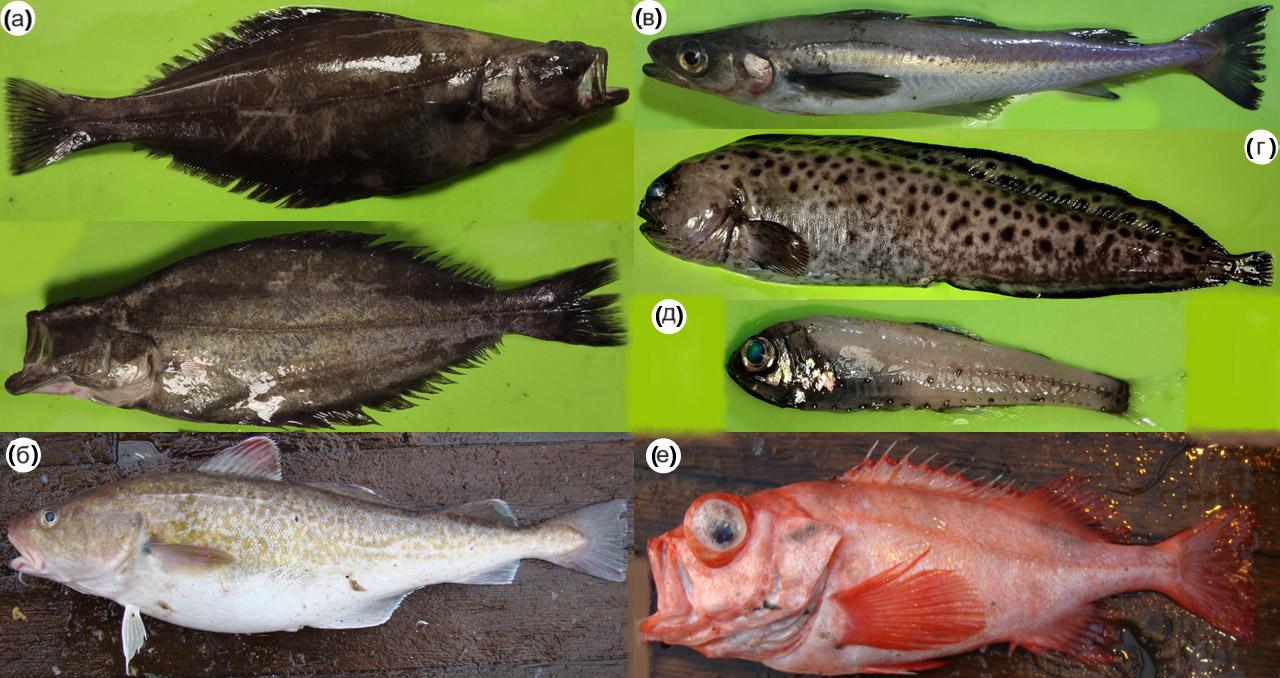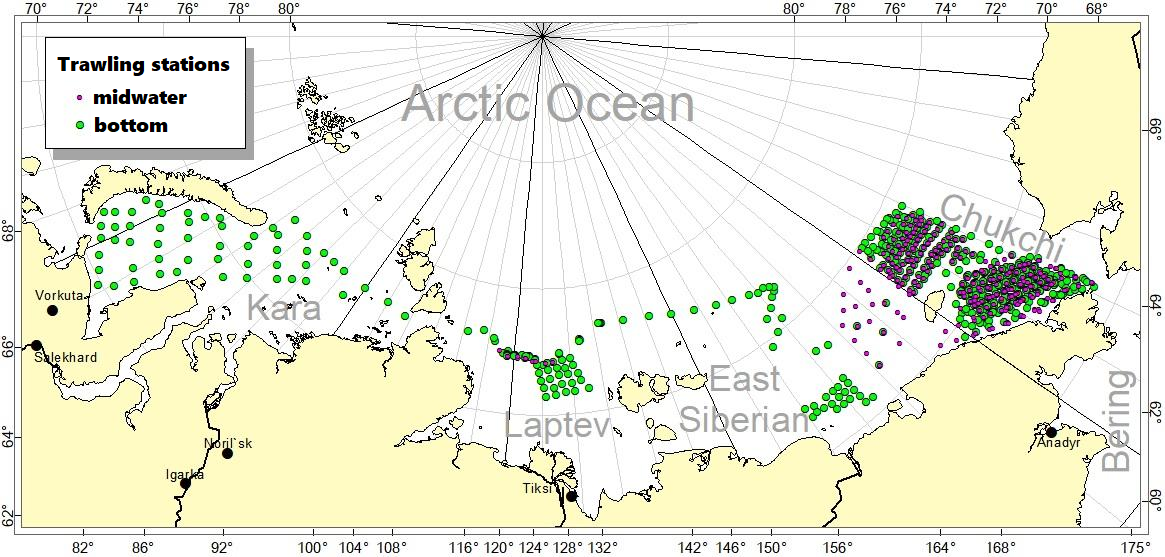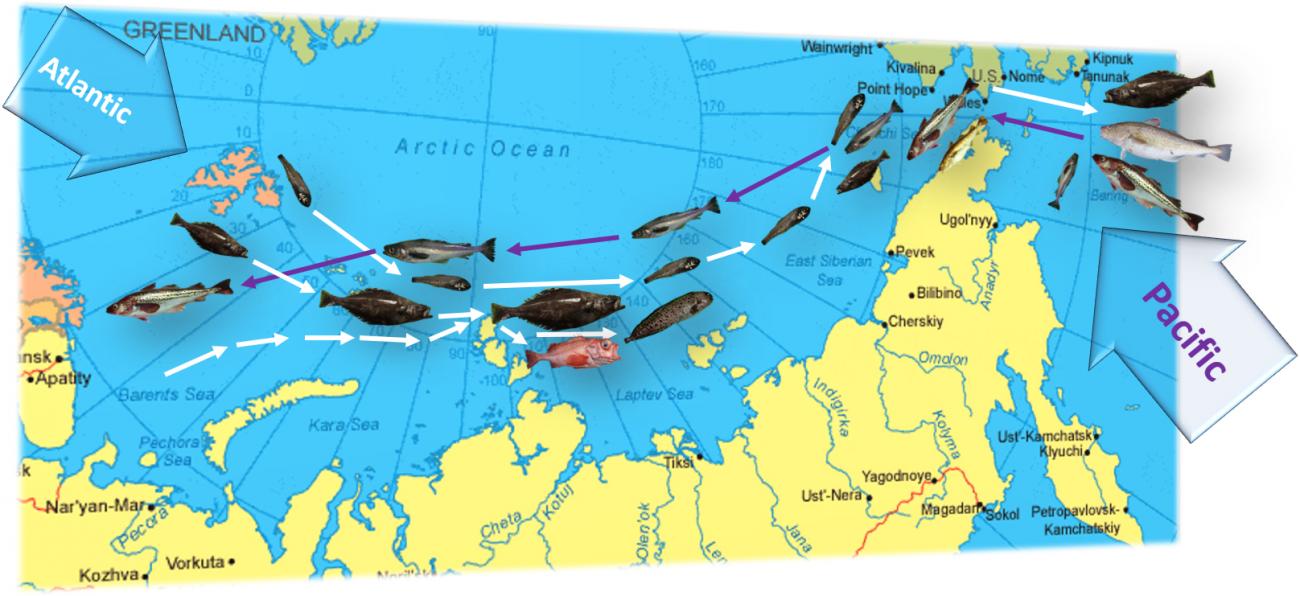
Recent climate changes on Earth, most pronounced in the polar regions, are one of the most pressing environmental problems of our time. Warming in the Arctic has initiated an ever-increasing influence on it from the Atlantic and Pacific oceans, which is manifested in the transfer of heat by currents and the erasing of differences in conditions between individual regions of the Arctic and the northern parts of the Atlantic and Pacific. In the scientific literature, this phenomenon received the names “Atlantification” (or “Atlantization”) and “pacification,” respectively. These processes lead to the transition of Arctic marine ecosystems to a more moderate state, which is commonly called “borealization.” The impact of borealization on individual fish species and ichthyocenes in the Arctic has not been sufficiently studied. Most of the published data concerns the seas of the European Arctic (Barents Sea and Greenland waters) or the expansion of the ranges of boreal fish species capable of long active migrations into Arctic waters.
Employees of the Institute of Oceanology (IO RAS) and the Institute of Ecology and Evolution (IEE RAS) of the Russian Academy of Sciences presented new information on the occurrence, abundance, biomass and size composition of six boreal fish species (Fig. 1): black halibut Reinhardtius hippoglossoides, Pacific cod Gadus macrocephalus, pollock G. chalcogrammus, spotted catfish Anarhichas denticulatus, beaked perch Sebastes mentella and benthosema Benthosema glaciale) in the Siberian Arctic seas (Kara, Laptev, East Siberian and Chukotka), obtained from open databases (OBIS, GBIF and FishBase) and the results of scientific ship observations in 1977-2020. (Fig. 2).

It turned out that in open databases information on the captures of these species is available mainly for the eastern part of the Chukchi Sea and the Beaufort Sea, but is practically absent for the seas of the Russian Arctic. Data from ship observations indicate an expansion of the ranges of Atlantic species in the eastern direction, and Pacific species in the western direction (Fig. 3), which indicates the ongoing borealization of the seas of the Siberian Arctic under the influence of the changing climate.

Further warming in the Arctic may lead to the closure of the ranges of the “western” and “eastern” populations of black halibut, which will make it possible to exchange genetic material between them and will help erase the differences between individuals of Atlantic and Pacific origin. The emergence of Pacific cod in recent years as a result of climate change in the Pacific Arctic may in the future lead to the closure of its range with the range of the Greenland cod Gadus ogac (which are considered separated in the waters of northern Alaska), the possibility of the exchange of genetic material and further blurring of differences between these species. The captures in recent years of individual adult pollock in pre-spawning, spawning and post-spawning states indicate the possibility of spawning in this area. In the event of further warming in the Arctic, it is possible that not only spawning, but also the survival of pollock offspring will become possible in the Chukchi Sea. Since there are theoretical possibilities for the survival of benthozema offspring in the waters of the continental slope and/or the return of individuals with countercurrents to the North Atlantic, there is no reason yet to consider the waters of the Arctic as an area of sterile eviction (as indicated by some authors).
Orlov A.M., Volvenko I.V. 2024. Ongoing borealization of Siberian Arctic marine ichthyofauna: Further evidence // Progress in Oceanography. Art. 103288 https://doi.org/10.1016/j.pocean.2024.103288.
Related materials:
RAS: "Changes in the fish fauna in the Siberian Arctic under the influence of a changing climate"
